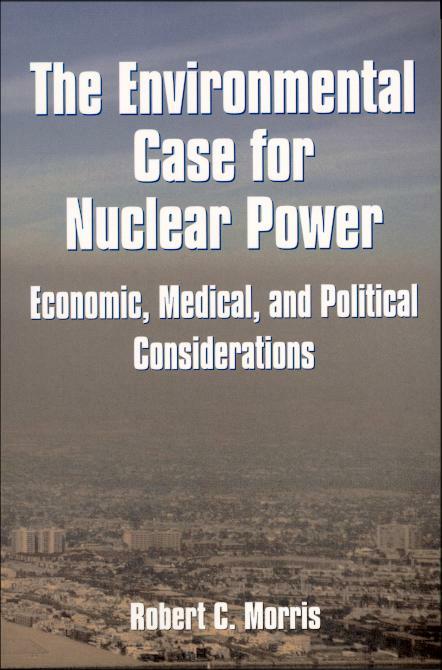The Environmental Case for Nuclear Power: Amazon Kindle Edition
Impressive—
“I am impressed the author’s approach and analysis of energy, and in particular,
nuclear energy.... The author successfully gives a complete overview on
the topic of energy. This book should be read by decision makers on the
political and industrial level, and most of the educated laymen will find
the new approach of reevaluating the importance of nuclear power for the
future well-being of mankind fascinating, instructive and often thrilling.”—Michael
J. Higatsberger, Institute for Experimental Physics, University of Vienna,
Austria
Authoritative—
“Authoritative and filled with facts, it should dispel irrational fears...”—S.
Fred Singer, Ph.D., President, Science and Environmental Policy Project,
Fairfax, VA
A side of the energy story not previously provided—
“[This book contains] an interesting idea not expressed in most environmental
books.... There is a distinct need to provide a side of the energy story
that up to this point has not been provided. [It] should provide some
lively discussion in the environmental sciences...arguments are well-weighted
and convincing.”—Donald W. Humphreys, Ph.D., Professor,
Environmental Engineering and Coordinator of the Program, Temple University
Everyone needs to hear its message—
“This is a story which must reach everyone if we are to avoid the disaster
described.”—Clyde Dilley, Ph.D., former Professor of Mathematics,
University of Toledo
“This book covers material that all citizens in this country need to understand. Indeed, the very survival of our way of life, and for many even life itself, depends on understanding the realities of our energy situation. The information and conclusions in this book make it an ideal reference source for use by serious students, as well as the general public.”—Walter Raczynski, M.S., Science Department Chairman, Addison Trail High School, Addison, Illinois
Without the use of massive amounts of energy, modern civilization ceases to exist. Today, there are only two technologies capable of meeting this need: burn the fossil fuels, or use nuclear power plants.
During the 20th Century, air pollution produced by the fossil fuels killed over five million Americans. Our reliance on oil from the Middle East forced us into the recessions of 1973 and 1979, and led to the 1991 war with Iraq. Further, our unwise use of fossil fuels contributes significantly to two of our worst environmental problems–acid rain and global warming.
By contrast, Western-built nuclear power has never been responsible for even one death in the public sector. It’s increased use would diminish the specter of recessions and war, would lessen our trade deficit, and decrease the threat of acid rain and global warming.
So, why aren’t we building any nuclear power plants? Since 1974, anti-nuclear power activists have prevented the construction of nuclear power plants in the U.S. with a succession of horror stories about a catastrophic accident which, in our forty years, has never happened.
The Environmental Case for Nuclear Power compares the facts regarding the use of the fossil fuels and nuclear power. Nuclear power emerges as being so clearly superior that one can only wonder why the superstition that nuclear power plants are too problematic to use persists.
When the established records of the fossil fuels and nuclear power are examined regarding waste disposal, environmental impact, economic impact, the risks run, and the accidents which have actually occurred, nuclear power is clearly superior. This is not just the author’s opinion; but is also the opinion of almost one million scientists and medical doctors who have gone on record as favoring the use of nuclear power.
Table of Contents
Preface
Chapter 1: The Fossil Fuels
Chapter 2: Found: A Substance with 2.7 Million Times More Energy Per
Pound than Coal!
Chapter 3: The “Unsolvable Problem” of Waste Removal
Chapter 4: Air Pollution: Twentieth Century Scourge
Chapter 5: The Environmental Effects of Using the Fossil Fuels and
Nuclear Power
Chapter 6: Risky Business
Chapter 7: What the Record Shows About Accidents
Chapter 8: What Are the Alternatives?
Addresses of Television Networks
Notes
Recommended Reading
Index
ROBERT C. MORRIS received his Ph.D. in Science Education and is a retired Chemistry teacher, Educational Consultant and former Chairman of the Science Department for Illinois High School District 88. Morris is a recipient of the American Chemical Society Award for outstanding work in chemical education, received honorable mention in the National Science Teachers Association’s program to select the U.S. science teacher of the year, and was a four-time recipient of National Science Foundation grants.




